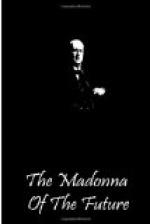shadow, gleamed certain dim sculptures which I wonderingly
approached. One of the images, on the left of
the palace door, was a magnificent colossus, shining
through the dusky air like a sentinel who has taken
the alarm. In a moment I recognised him as Michael
Angelo’s
David. I turned with a
certain relief from his sinister strength to a slender
figure in bronze, stationed beneath the high light
loggia, which opposes the free and elegant span of
its arches to the dead masonry of the palace; a figure
supremely shapely and graceful; gentle, almost, in
spite of his holding out with his light nervous arm
the snaky head of the slaughtered Gorgon. His
name is Perseus, and you may read his story, not in
the Greek mythology, but in the memoirs of Benvenuto
Cellini. Glancing from one of these fine fellows
to the other, I probably uttered some irrepressible
commonplace of praise, for, as if provoked by my voice,
a man rose from the steps of the loggia, where he
had been sitting in the shadow, and addressed me in
good English—a small, slim personage, clad
in a sort of black velvet tunic (as it seemed), and
with a mass of auburn hair, which gleamed in the moonlight,
escaping from a little mediaeval birretta. In
a tone of the most insinuating deference he asked
me for my “impressions.” He seemed
picturesque, fantastic, slightly unreal. Hovering
there in this consecrated neighbourhood, he might
have passed for the genius of aesthetic hospitality—if
the genius of aesthetic hospitality were not commonly
some shabby little custode, flourishing a calico pocket-handkerchief
and openly resentful of the divided franc. This
analogy was made none the less complete by the brilliant
tirade with which he greeted my embarrassed silence.
“I have known Florence long, sir, but I have
never known her so lovely as tonight. It’s
as if the ghosts of her past were abroad in the empty
streets. The present is sleeping; the past hovers
about us like a dream made visible. Fancy the
old Florentines strolling up in couples to pass judgment
on the last performance of Michael, of Benvenuto!
We should come in for a precious lesson if we might
overhear what they say. The plainest burgher
of them, in his cap and gown, had a taste in the matter!
That was the prime of art, sir. The sun stood
high in heaven, and his broad and equal blaze made
the darkest places bright and the dullest eyes clear.
We live in the evening of time! We grope in
the gray dusk, carrying each our poor little taper
of selfish and painful wisdom, holding it up to the
great models and to the dim idea, and seeing nothing
but overwhelming greatness and dimness. The days
of illumination are gone! But do you know I
fancy—I fancy”—and he grew
suddenly almost familiar in this visionary fervour—“I
fancy the light of that time rests upon us here for
an hour! I have never seen the David so grand,
the Perseus so fair! Even the inferior productions
of John of Bologna and of Baccio Bandinelli seem to




